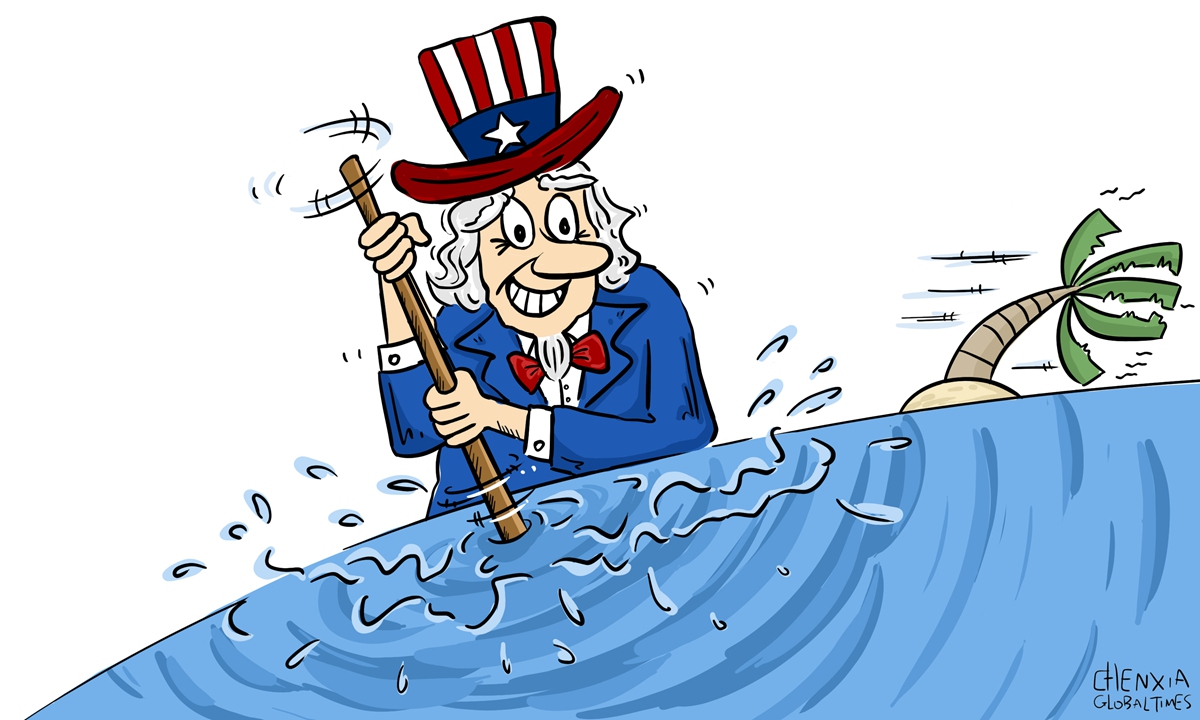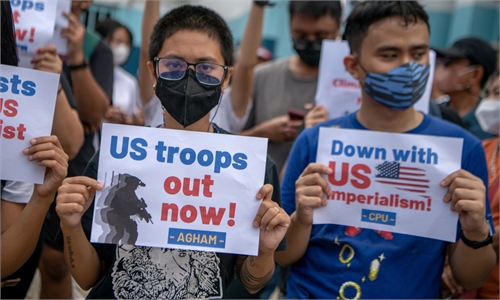
US, South China Sea Illustration: Chen Xia/GT
"The United States is back," former US Secretary of State Hillary Clinton declared on July 21, 2009 upon arrival in the Thai capital. Many people did not understand the significance of this line at the time, as in their views, the US had not left Asia and US capital investment in Asia continued to grow.13 years later, no one would find this sentence difficult to understand
A recent military exercise between the US and the Philippines, known as Balikatan, a Tagalog term that means "shoulder-to-shoulder," has shown Asia what "the United States is back" really means.
The Philippines was once the only US' colony in Asia. The US military withdrew from its bases in the Philippines at one point, but now it has not only returned, but is also conducting large-scale military exercises.
According to reports, the joint exercise will continue until April 28, with about 12,200 US troops, 5,400 Philippine troops, and 111 Australian troops participating. After the joint military exercise began, the US and Philippine foreign and defense ministers' "2+2" dialogue also took place.
The US has been working hard to strengthen military alliances in the Indo-Pacific region and build a US-led military arc to counter China. This military exercise is considered the "latest firepower display" of the US in Asia.
What is the US worried about? Is there an imminent risk of war in Asia?
Obviously, the US is intentionally creating tensions. Although there are maritime disputes between China and some neighboring countries, they have not reached the point of war or conflict.
China and the Association of Southeast Asian Nations (ASEAN) are working to negotiate the Code of Conduct in the South China Sea based on the Declaration on the Conduct of Parties in the South China Sea. Since the signing of the Declaration more than 20 years ago, the South China Sea has been calm. The so-called freedom of navigation issue that the US and Western countries have been hyping up has not even appeared.
Obviously, the US is using Asia's security issues as a lever to deploy military forces and to continue maintaining the Asia order that it has worked hard to keep operation since World War II.
It is the development of Asia in the 21st century, especially the rise of China, that has made Asians pursue their own order, which makes America feel that they need to "return to Asia."
Since China joined the World Trade Organization (WTO) at the end of 2001, its development entered a fast lane. Due to China's strong resistance, the financial crisis that broke out in 1997 receded from Southeast Asia. China played a leading role in boosting Southeast Asia out of the recession.
In 2002, China signed the Declaration on the Conduct of Parties in the South China Sea with Southeast Asian countries based on the basic principle of "shelving disputes and promoting joint development" proposed by Deng Xiaoping. Eight years later, China and ASEAN established a free trade area, and cooperation between the "10+3" (ASEAN, China, Japan, and South Korea) has continued to advance in fields such as finance and food. The embryo of a new Asia order is taking shape.
This is why Hillary Clinton said "The United States is back " in 2009.
From the Trump administration to the Biden administration, US officials have been accusing China of being a disruptor of the world order. The core issue is that Washington cannot allow any country to challenge its dominant position in the entire Asia-Pacific region. By increasing its military presence, exacerbating regional conflicts, and creating divisions, the US can manipulate its hegemony.
Rather than saying that the US is unwilling to let China lead the integration of the entire region, it is more accurate to say that the US does not want the region to integrate on its own.
The key to determining the future of Asia's fate is whether Asian countries can free themselves from external interference and control, and regain control over their own destiny.
Former Singaporean Ambassador to the United Nations, Kishore Mahbubani, recently said that the history of the world dominated by the West is coming to an end, and now the West is accelerating its decline, and the future will be dominated by the "CIA era" formed by China, India, and ASEAN.
The rise of emerging economies such as India, Vietnam, and Indonesia is inevitable. China's development has driven and inspired the development of the entire region. These countries will not follow the US's command to draw lines and take sides. Instead, they will eventually choose more cooperation due to increased economic and trade ties. This process may be tortuous and lengthy, but it conforms to the law of human progress. The order that Washington is striving to maintain through military force is doomed to collapse.

